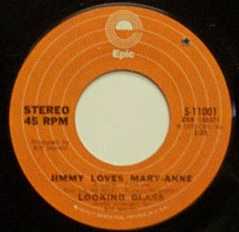
- Format: LP

Following up "Brandy (You're a Fine Girl") wouldn't be easy. The wonderful Larry Fallon arrangement and uncredited production on that number one tune from 1972 would be hard to duplicate. Arif Mardin takes over the production reigns on this sequel, the Subway Serenade LP, and the affair is very color-by-number. "Jimmy Loves Mary-Anne" gave singer Eliot Lurie another chance at pop stardom, and 14 months after the initial hit, this one barely broke the Top 35. Lurie's blasé vocal, which worked so well on the seafaring tale that was "Brandy," accompanies the elegant and simple music here, never able to surpass it. The band is competent, falling somewhere between a poppier Atlanta Rhythm Section or Ace, the '70s group who hit with "How Long," but the music goes nowhere. "City Lady" and "Sweet Somethin'" stall. Marty Balin would take this concept over the top with his renditions of Jesse Barrish tunes on his two solo albums in the '80s, like the hit "Hearts," and that is the difference between what is good and what is great. Bassist Piet Sweval's "For Skipper" sounds like Dan Fogelberg performing Fleetwood Mac's "Landslide," and you'd never guess this was Looking Glass if it was the Flo & Eddie "Blindfold" test. Epic waited too long in between hits; the band should have crafted 45s and issued them while recording this as the group Stories hunted around for a "Brother Louie" during this same time period. "Are You Dreamin'" continues the lackluster style, and it is followed by another 180-degree turnaround by Piet Sweval's Poco-style folk-rock. There's nothing bad about the album; it just treads water and doesn't beg repeated listenings. They had something, but just couldn't capitalize on it. When you hear "Jimmy Loves Mary-Anne" it brings you back to the early '70s, the sound so identifiable with that era. Why Arif Mardin didn't bring outside material in is the mystery of it all. It's a good thing Elliot Lurie discovered the magic of movie soundtracks — his work on Subway Serenade is more like one big lullaby.